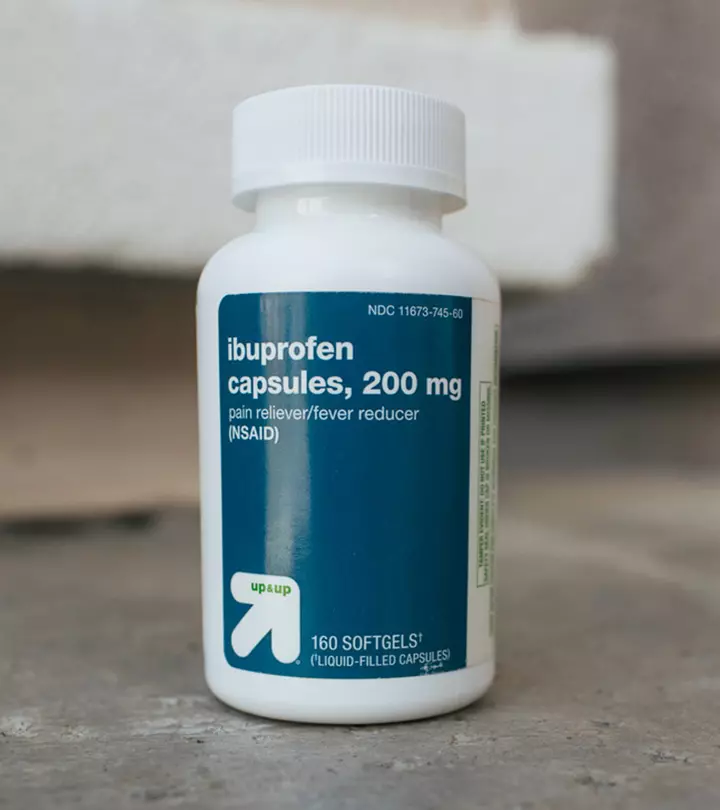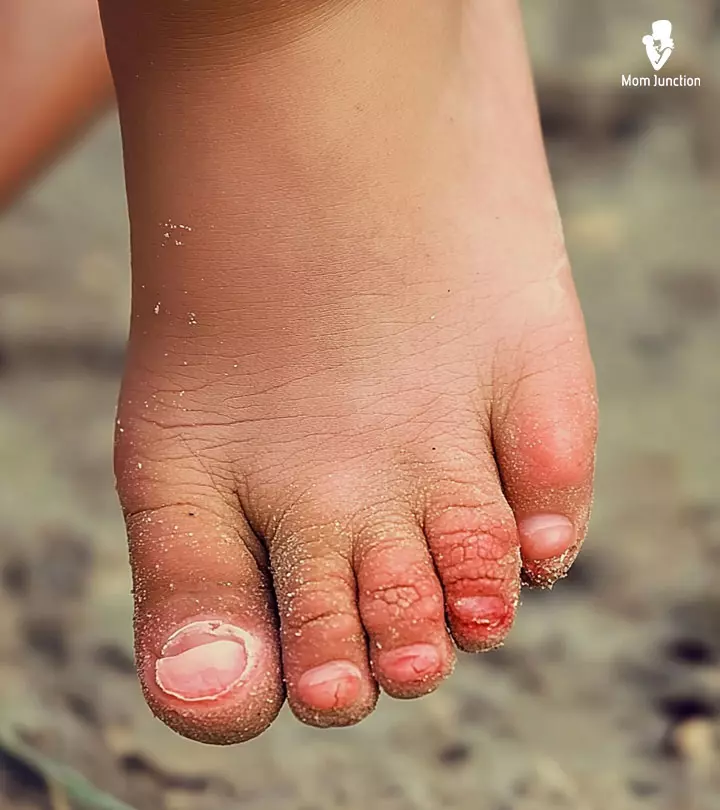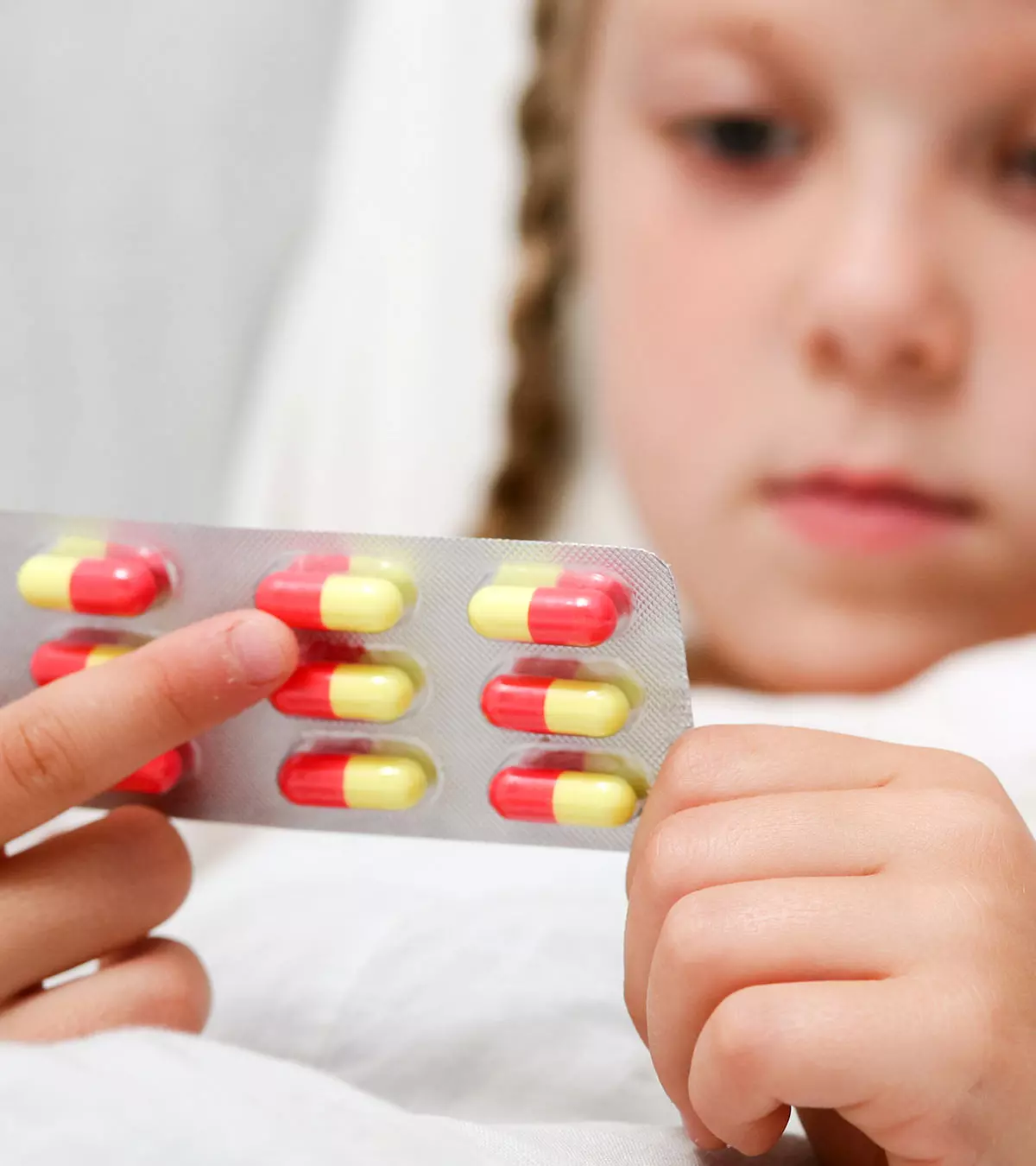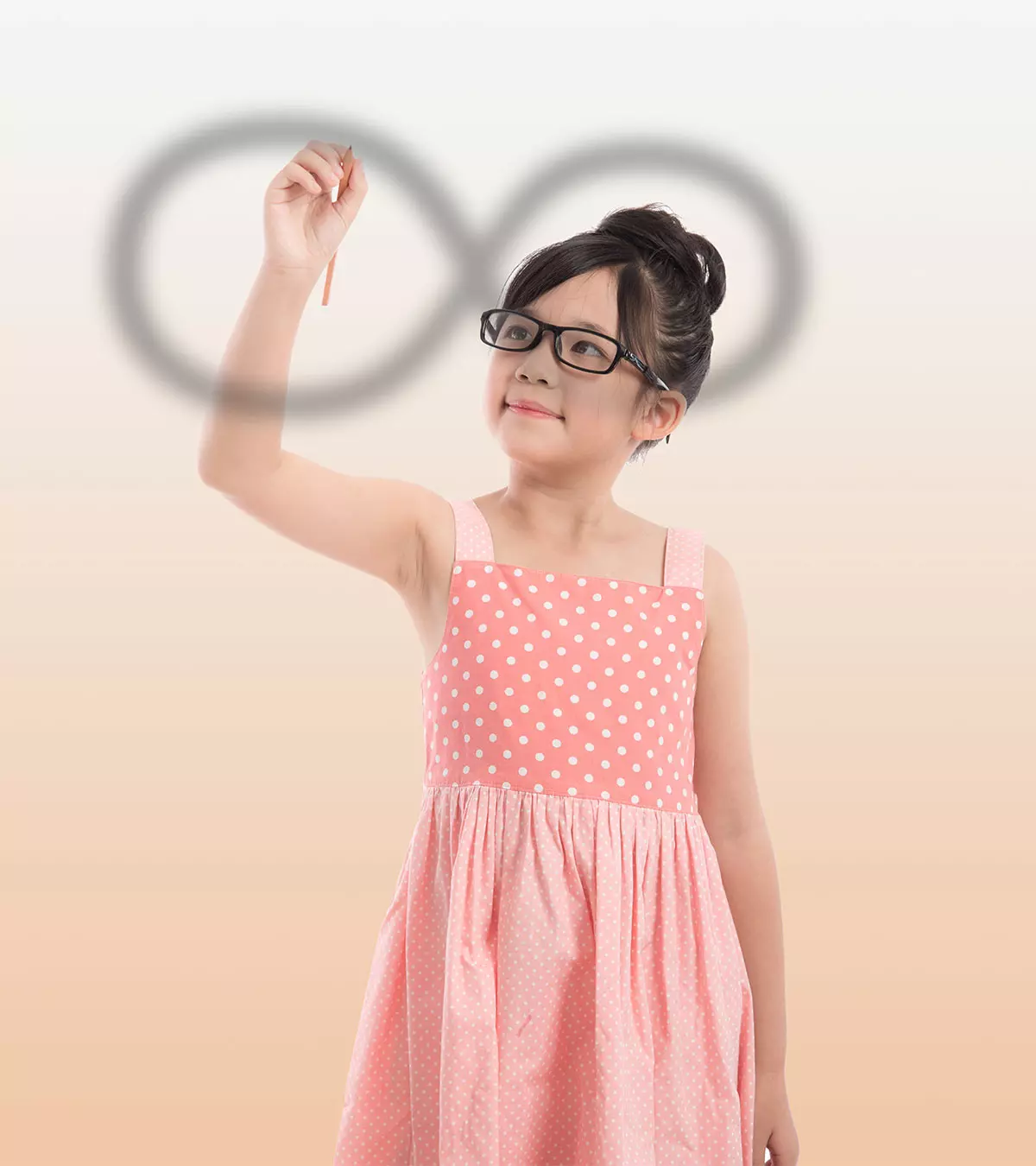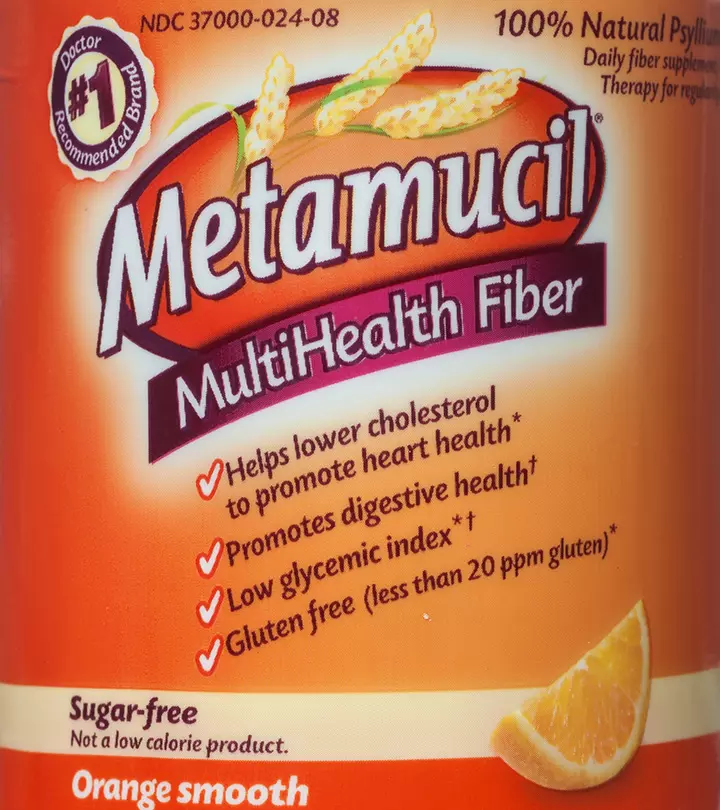
Image: iStock
Fiber is an essential component of the diet. It promotes gut health by improving satiety from food and affecting the easy passage of stools. Additionally, it benefits the heart by lowering low-density lipoprotein (LDL or bad cholesterol) levels, reduces the risk of type 2 diabetesiA condition identified by impaired glucose metabolism in the body because of insufficient insulin production or insulin resistance by lowering glucose levels, and helps in body weight control (1).

Metamucil is a dietary fiber supplement containing 100% natural psyllium husk, which comes from the psyllium plant (2). It is available over the counter (OTC) for relief from occasional constipation (3). This post talks about the safe use of Metamucil for kids, its side effects, and precautions.
Key Pointers
- Metamucil is a fiber treatment for constipation. Every teaspoonful of Metamucil contains approximately 3.4 g of psyllium.
- Do not administer Metamucil to your child if they have a drug allergy or phenylketonuria.
- Metamucil may cause stomach discomfort, cramps, or bloating in children.
- Make sure your child drinks enough water or other fluids after taking Metamucil.
Can Children Take Metamucil?
Yes, Metamucil is available OTC for both adults and children as fiber therapy for bowel regularity in constipation, which is two or fewer episodes of motion per week with the passing of hard stools with pain or straining (3).
According to the American Academy of Pediatrics (AAP), children should have a fiber intake in the range equivalent to a child’s age plus five grams per day to a child’s age plus ten grams per day. Lesser amounts of fiber may cause constipation in children (4). The psyllium in Metamucil is a bulk-forming laxative that helps in bowel movement. It helps stool hold water, making it softer and easier to pass (5).
The fiber also acts as a prebiotic that helps promote healthy gut bacteria growth in the gut and improve overall digestion.
 Did you know?
Did you know?Who Should Not Take Metamucil?

Metamucil may be used as a fiber supplement for most children. Nevertheless, you should talk to a doctor before administering psyllium-containing preparations to ensure your child’s wellness. Your child may need to avoid it in the following cases (6).
- Your child has food or drug allergies.
- The product contains phenylalanineiAn essential amino acid found in dairy and plant proteins . Therefore, it may not be suitable for children with phenylketonuriaiAn inherited condition that causes an inability to metabolize phenylalanine (PKU).
What Is The Metamucil Dosage For Children?

Each teaspoonful of Metamucil contains approximately 3.4 grams of soluble fiber (psyllium husk). Other ingredients include aspartameiAn artificial sweetener , citric acid, maltodextriniA highly processed polysaccharide made from plant starch and is light for digestion , natural and artificial orange flavor, and color.
You should start with one dose a day with or without food. It usually acts in 12 to 72 hours if given in doses as per the following table (3).
| Age (years) | Dose |
|---|---|
| 6-11 | Half a teaspoon in 8 ounces (240ml) of liquid up to three times daily |
| 12 and older | One rounded teaspoon in 8 ounces (240ml) of liquid up to three times daily |
Consult a doctor if your child is below six years of age or if symptoms persist. You may pick any liquid of your choice, such as cool milk or fruit juice, although water might be an appropriate choice considering Metamucil has some added flavors. Stir and serve it to the child immediately.
Metamucil is also available as capsules, flavored wafers (crunchy fiber snacks), and gummies, containing four to five grams of psyllium per serving as claimed by the product label (7). You may consult a doctor if you wish to serve Metamucil in other forms since the dosage may vary.
Children often refuse medicines because of their plain look and bitter aftertaste. Therefore, the variety of colors and flavors available in Metamucil may make this medicine child-friendly. Also, the availability of Metamucil in different forms – powdered forms, gummies, and capsules, gives children an option to choose depending on their preference and tolerance.
 Be watchful
Be watchfulWhat Are The Side Effects Of Metamucil In Children?
Serious adverse effects are rare with Metamucil. However, common metamucil side effects due to psyllium include (8):
- Bloating
- Stomach pain

- Stomach cramps
- Changes in bowel habits
Talk to a pediatrician if these cause discomfort to your child or do not go away. Immediate medical attention is necessary if symptoms of allergic reactions are seen, such as (6):
- Rash
- Redness or itching

- Swelling of face, lips, or tongue
- Hives
- Difficulty in breathing or swallowing
- Wheezing
What Precautions To Take When Using Metamucil For Children?
Most children can have Metamucil safely. However, you should consult a doctor before adding Metamucil to your child’s routine if your child has symptoms such as (6):
- Rectal bleeding
- Severe stomach pain
- Nausea and vomiting
- Difficulty in swallowing
- Fecal impaction (stool stuck in colon or rectum)
- Two weeks or more of a sudden change in bowel habits
Once you decide to give your child Metamucil for easing constipation or as a dietary supplement to keep digestion-related issues at bay, you should observe the following measures (3) (6).
- Inform your child’s healthcare provider if your child is on any other medication before starting Metamucil. Psyllium interferes with the absorption of certain drugs taken by mouth, and they should be spaced from psyllium dosage by at least two hours.
- You must also first take the doctor’s opinion if your child is already on any nutritional or herbal supplement.
- Make your child drink lots of water or fluids if not advised otherwise by a doctor. Taking Metamucil (especially the powder forms) without adequate liquids may cause it to swell before reaching the stomach and partially block the food pipe, causing discomfort.

- Make sure your child does not inhale Metamucil powder as it may lead to respiratory discomfort and allergy.
- Metamucil products may contain varying amounts of sodium and potassium (the exact amount will be mentioned on the product label). Consult a healthcare provider if your child has high blood pressure or is on a low sodium diet.
- Discontinue Metamucil use if constipation lasts beyond seven days or rectal bleeding occurs.
- Refer to the product label and package inserts for dosage instruction for different Metamucil products (powder, capsule, wafers, or gummies). You may also seek advice from a general physician.
- Store the powder at room temperature in a tightly-closed container to avoid contact with moisture.
- Keep it out of children’s reach and seek immediate medical attention in case of overdose.
Alternative Sources Of Fiber For Children
While prescription fiber supplements like Metamucil effectively promote bowel regularity, their prolonged use is generally not recommended. Medical expert Dr. Po-Chang Hsu explains, “When it comes to supporting a child’s digestive health through diet, high-fiber foods like chia seeds, pomegranate seeds, chickpeas, raspberries, prunes, artichokes, sweet potatoes, barley, sunflower seeds, and green peas can naturally support healthy bowel movements. These foods provide fiber and essential nutrients contributing to overall gut health.” Thus, parents should opt for alternative sources of dietary fiber, choosing between a wide range of soluble and insoluble fibers (13).
- Foods like avocado, pear, artichoke, asparagus, brussels sprouts, brazil nuts, and quinoa are rich sources of soluble fiber.
- Foods like blueberry, beetroot, broccoli, eggplant, mushrooms, almond, roasted peanut, brown rice, maize, whole wheat, beans, chickpeas, oats, muesli, and lentils are among the richest sources of insoluble fiber.
Frequently Asked Questions
1. Is Metamucil or miralax better?
Metamucil and Miralax are both over-the-counter laxativesiA type of drug that helps relieve constipation by improving bowel movements used to treat constipation. However, Metamucil may take slightly longer to act than Miralax for kids, and it is shown to carry an increased risk of causing side effects. Moreover, consuming Miralax without sufficient water may worsen your symptoms (9).
2. What age can my child take Metamucil?
Although the liquid form of Metamucil could be given to children after six years, the oral, capsule form of the medication is usually prescribed for children above twelve (10).
3. What type of Metamucil is best for children?
Metamucil is available in various forms, such as a capsule, powder, or wafer (12). You may administer it to your child in any form after consulting your doctor. They will select a suitable Metamucil form for your child based on the product’s fiber content and other factors, such as the child’s ability to chew or swallow.
As a caring parent, you might have included fiber-rich foods for kids in your child’s diet and done your research on the best foods to relieve constipation in kids. However, despite your efforts, if your child still shows symptoms of constipation, you may opt for fiber supplements for your children. Metamucil for kids is safe if given as per age unless they have any conditions such as an allergy, phenylketonuria, or undergoing another supplementation. So even though it is an OTC supplement, it is better to consult a doctor first to know about the precautionary measures to avoid complications, be aware of the possible side effects, and stay prepared accordingly.
Infographic: Recipes Suggested By Metamucil Manufacturer
Metamucil may be added to several food items to mask its blandness and make it more acceptable to children. Check out the infographic below to learn some delicious psyllium husk recipes suggested by Metamucil.
Some thing wrong with infographic shortcode. please verify shortcode syntax
Illustration: Metamucil For Kids: Dosage Side Effects And Precautions

Image: Dall·E/MomJunction Design Team
Discover various methods to administer Metamucil for optimal results and explore the diverse product range offered in the market from this video.
References
- Joanne Slavin Fiber and Prebiotics: Mechanisms and Health Benefits.
https://www.ncbi.nlm.nih.gov/pmc/articles/PMC3705355/ - A.F.G. Cicero Metamucil as an additional source of dietary fiber: impact of the quality of healthcare professionals\’ recommendations on users\’ experience.
https://pubmed.ncbi.nlm.nih.gov/25912593/ - Metamucil therapy for regularity- psyllium husk powder.
https://dailymed.nlm.nih.gov/dailymed/fda/fdaDrugXsl.cfm?setid=a9824f73-5ea2-4a65-a926-3a57561441b8&type=display - Christine L. Williams et al. A New Recommendation for Dietary Fiber in Childhood.
https://pediatrics.aappublications.org/content/96/5/985?download=true - Psyllium.
https://medlineplus.gov/druginfo/meds/a601104.html - Psyllium.
https://www.mskcc.org/cancer-care/patient-education/medications/pediatric/psyllium - Fiber Supplements.
https://www.ucsfhealth.org/education/fiber-supplements - Psyllium.
https://www.mottchildren.org/health-library/d01018a1 - Aiman A. Soomro; Constant Constipation: Miralax vs. Metamucil. Which Over the Counter Product Better Treats Chronic Constipation?
https://csef.usc.edu/History/2015/Projects/J1922.pdf - Psyllium oral capsule.
https://my.clevelandclinic.org/health/drugs/18281-psyllium-capsules - Robert J. Shulman et al.; (2016); Psyllium Fiber Reduces Abdominal Pain in Children With Irritable Bowel Syndrome in a Randomized, Double-Blind Trial.
https://www.ncbi.nlm.nih.gov/pmc/articles/PMC5064811/ - Metamucil
https://www.medicoverhospitals.in/medicine/metamucil - Silvia Salvatore et al.; (2025); Dietary Fibers in Healthy Children and in Pediatric Gastrointestinal Disorders: A Practical Guide.
https://pmc.ncbi.nlm.nih.gov/articles/PMC10180776/#sec3-nutrients-15-02208
- Joanne Slavin Fiber and Prebiotics: Mechanisms and Health Benefits.
Community Experiences
Join the conversation and become a part of our nurturing community! Share your stories, experiences, and insights to connect with fellow parents.
Read full bio of Dr. Ashley Van Putten

Dr. Po-Chang Hsu is a medical doctor and medical content expert. He received his medical degree from Tufts University School of Medicine in Boston in 2016. Previously, he did a master’s degree at Harvard University and wrote a thesis on neuroimaging in schizophrenia patients at Brigham and Women’s Hospital. He currently works at Alpas Wellness.
Dr. Po-Chang Hsu is a medical doctor and medical content expert. He received his medical degree from Tufts University School of Medicine in Boston in 2016. Previously, he did a master’s degree at Harvard University and wrote a thesis on neuroimaging in schizophrenia patients at Brigham and Women’s Hospital. He currently works at Alpas Wellness.
Read full bio of Dr. Joyani Das
Read full bio of Dr. Ritika Shah
Read full bio of Vidya Tadapatri









